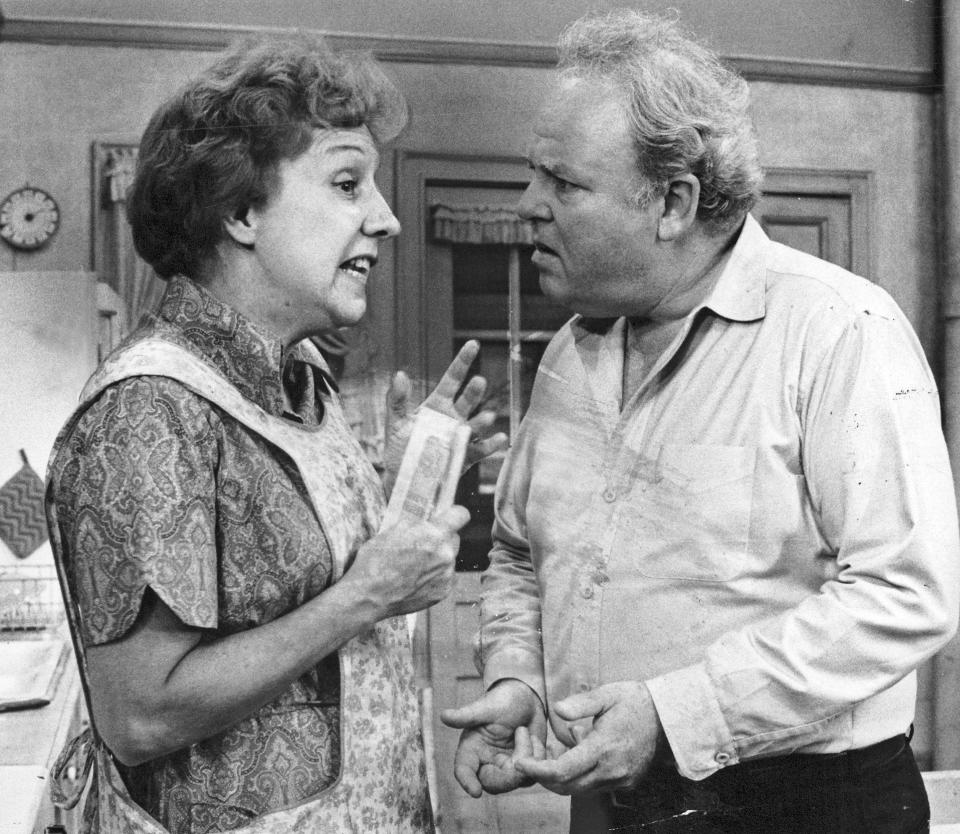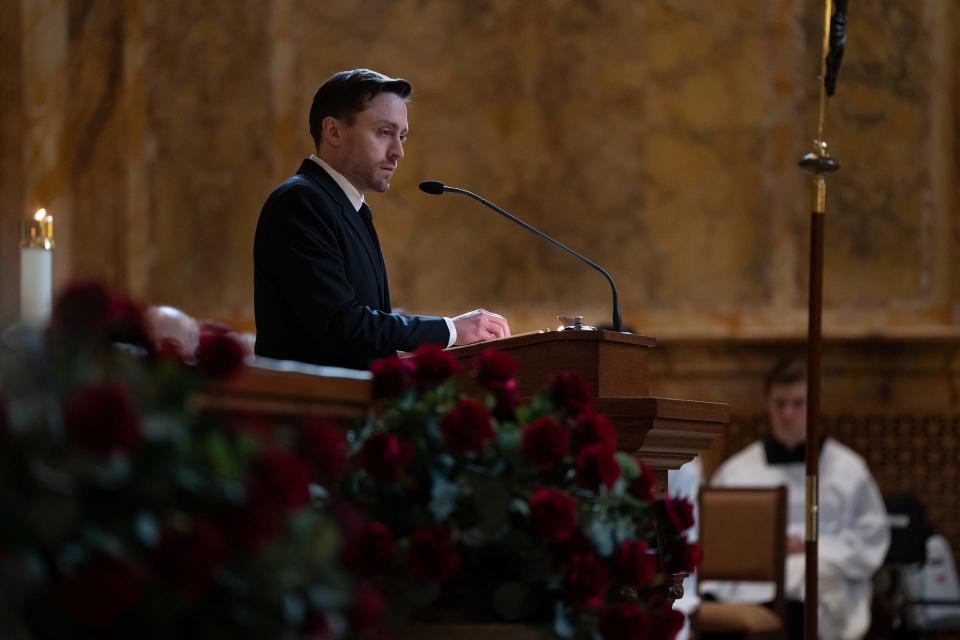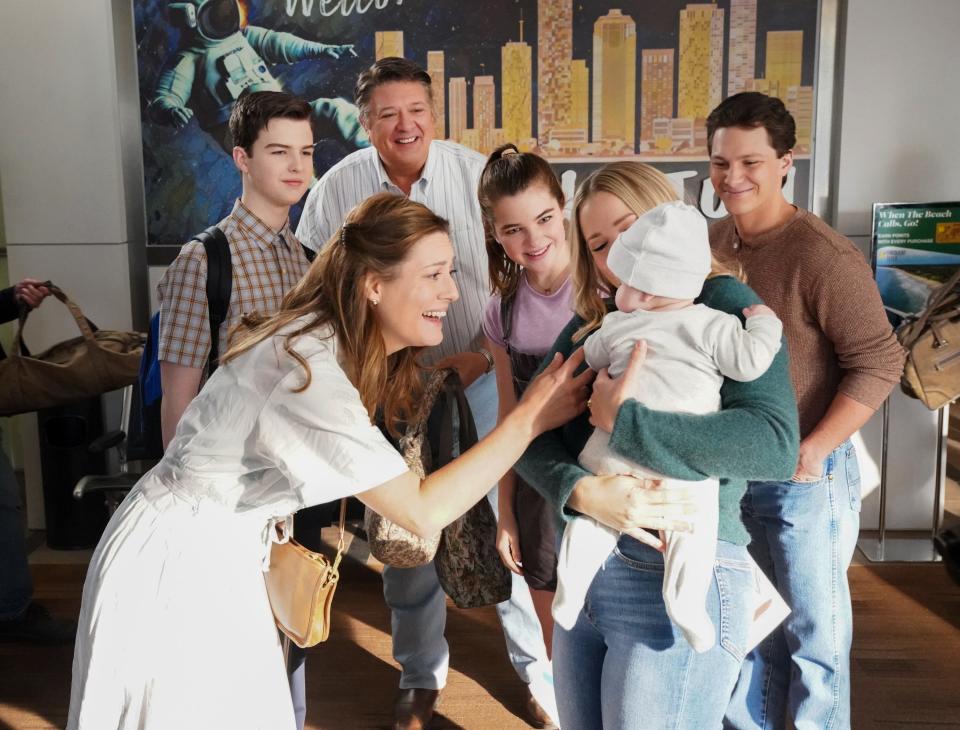Get out your handkerchiefs: A death in the family looms over a beloved TV sitcom
Spoiler alert: There could be a death in the family of TV’s fictional characters this season, one that is a reminder of how poignant such losses can be.
If you prefer shows with no deep emotional stakes, read no further. Go watch “Love Is Blind” or “The Bachelor” maybe. But if the passing of a made-up person on the small screen has ever made you get a little weepy, you understand why it matters.
Death used to be a plot device reserved for guest actors. Back in the old-timey days, killing off the star of a series was unthinkable. Lead characters were invincible, like Marshal Matt Dillon (James Arness) of “Gunsmoke,” who survived so many shootings to his arms, legs and various other body parts during the course of 20 seasons that he qualified as a medical miracle.

But actors booked for a single episode were fair game, especially if they were playing villains or young, beautiful women new to town and destined for tragic romances. In fact, the rate of unexpected fatal diseases among the new girlfriends of doctors in medical shows was so high, the Centers for Disease Control should have launched a major investigation.
As TV dramas and comedies grew in complexity, first on broadcast networks and then cable and streaming, scripted losses began to seem less like a ratings ploy or a convenient way to explain an actor’s departure (during the run of “Archie Bunker’s Place,” Edith Bunker, played by the ready-for-new-roles Jean Stapleton, died off-screen) and more like the randomness of real life.
A whole generation of baby boomer still recalls the shock of Radar O’Reilly entering the operating room to announce that the plane carrying Lt. Col. Henry Blake home from the Korean War had been shot down and crashed with no survivors. When it happened during the last scene of a 1975 “M*A*S*H” episode, it hit with the power of a real-life phone call in the middle of the night bearing bad news.
One of the most wrenching prime-time deaths ever happened in 1998 when actor Jimmy Smits of “NYPD Blue” exited the series. ABC had revealed that Smits was leaving, so there wasn’t an element of surprise. What hurt was the sensitively handled story arc of Det. Bobby Simone’s health struggles, first with a heart transplant, then with a brain infection that robbed Bobby’s chances for recovery. Just thinking of Bobby’s journey (and how his compassionate doctor fought against prolonging his pain) is enough for “NYPD Blues” fans to mourn him all over again.
In the years since then, death has become a regular part of shows with ambitious narratives as writers have dared to depict increasingly raw layers of ugliness and grief. Remember the terrifying 2004 murder of Adriana in a forest in “The Sopranos”? More than anything else in the HBO classic, it demonstrated just how ruthless organized crime can be, even to women and children.
The same message echoed powerfully two years earlier in HBO’s “The Wire,” when teenage drug dealer Wallace of the Barksdale Organization was killed for going to the police. Afterward, in a searing scene, D’Angelo Barksdale repeatedly asked Stringer Bell the haunting question, “Where’s Wallace?”
Sometimes, a fictional death can be horribly mishandled, as was the case with Glenn Rhee (Steven Yeun) on “The Walking Dead” in 2016, who was beaten to death by Negan and his bat. It was an excessively cruel, needlessly graphic end for a fan favorite who had evolved from being an everyman to a heroic protector of those he loved. For many, it was the moment that “The Walking Dead” jumped the shark and lost their viewership forever.
Most recently, the passing of Logan Roy (Brian Cox) last year on “Succession” was a movingly honest portrait of how difficult it is to accept the unacceptable. The Roy children slide from disbelief to the realization of what is happening on Logan’s plane as passengers speaking by phone hesitate to admit that he is dying. Later, at Logan’s funeral, his son Roman breaks down in front of his father’s coffin and asks, “Is he in there? Can we get him out?,” a moment that justifies Kieran Culkin’s recent Emmy win all by itself.

Now, spoiler alert (and we really mean it!), another potential heartbreaker may await a popular but critically underrated CBS series. As fans of “The Big Bang Theory” already know, it has been revealed that Sheldon Cooper’s father died when he was just 14. That raises the heartbreaking prospect that its prequel spin-off, “Young Sheldon,” which airs Thursdays at 8 p.m. and is in the midst of its final season, will be showing viewers exactly what happened — or not.
Although “Young Sheldon” executive producer Steve Holland confirmed to TVLine that the half-hour comedy will honor “the larger canon” of the adult Sheldon’s story, he didn’t reveal exactly how or when George Sr.’s demise would be handled. “I don’t want to say what you will or won’t see, but things will get addressed,” said Holland cryptically.

So what does that mean? Will George Sr. pass away on-screen? Off-screen? Will his fate be at the heart of an entire episode? Or will his untimely demise be mentioned briefly in an epilogue, maybe when Jim Parsons and Mayim Bialik reprise their "Big Bang Theory" roles as adult Sheldon and his wife, Amy, for the final episode of “Young Sheldon”?
In short, will we get to see the Cooper family struggle with the seismic event? Or will the show gently spare us as much sorrow as possible?
Whatever happens, it’s long overdue time to acknowledge how good “Young Sheldon,” which has been on the air since 2017, is. From the perfect casting of Zoe Perry as Sheldon’s mom, Mary (Perry is the daughter of Sheldon’s “Big Bang” mom, Laurie Metcalf), and Lance Barber as George Sr. to Annie Potts’ glorious turn as Sheldon’s grandmother, Meemaw, the 1990s-set series has consistently provided a window into the life of a family of modest means that is doing its best to get by.
While child-turned-teen prodigy Sheldon is supposed to be the center of the action, he’s just one part of the pie chart of what makes “Young Sheldon” worthwhile. The family dynamics are the star here, which makes it even sadder to ponder the death of its well-meaning, exasperated dad, who uses sports and beer as coping mechanisms and whose go-to emotion is losing his temper, and yet who always comes through with solid support for his kids in a pinch.
When they are done well, TV comedies and dramas can shed light on the human condition and help us confront our feelings about subjects we’d rather avoid. If “Young Sheldon” does decide to tackle George Sr.’s departure in detail, it might convey the twin truths that no one gets out of here alive and that dwelling on the inevitable is the worst way to deal with that inevitability. The best way? Living life to the fullest and making an effort to appreciate every day.
As “Young Sheldon” takes a short break for March Madness, let’s honor the show by waiting patiently to see what actually occurs. And when it returns next month, let’s focus on the privilege of watching the Coopers be their funny, caring, imperfect selves. The hour-long final episode isn’t until May 16. Let’s savor each remaining one as if it’s the last.
Contact Detroit Free Press pop culture critic Julie Hinds at [email protected].
This article originally appeared on Detroit Free Press: 'Young Sheldon' faces death of key character as series nears end
